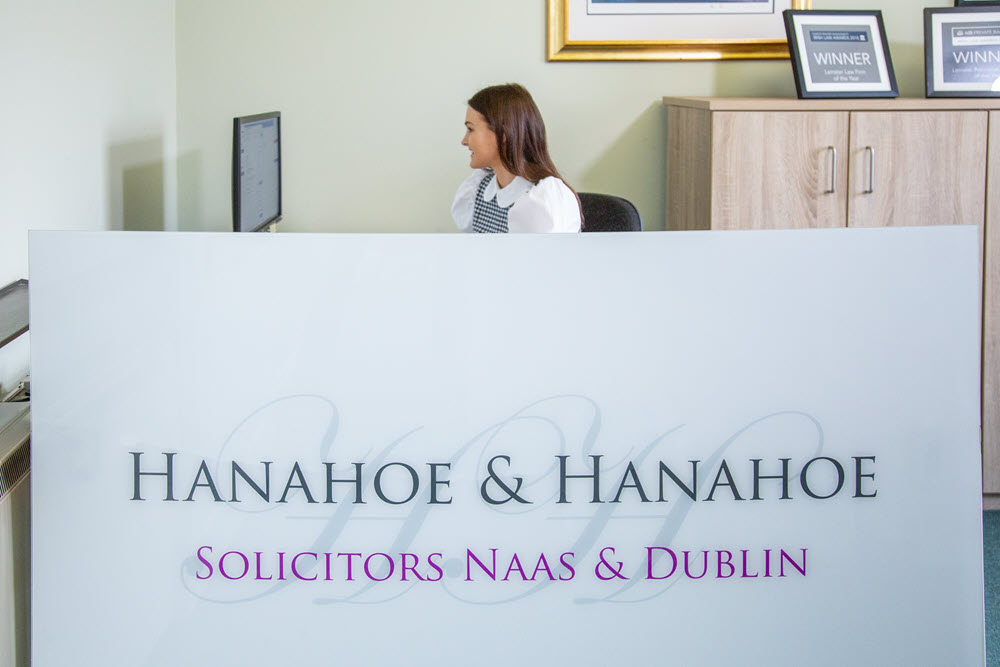Award Winning Personal Injury Solicitors
How do I take a Personal Injuries Claim*?
Whether you have been injured in a car accident*, an accident at work* or an accident in a public place*, the first thing you should do is seek medical attention. After you have sought medical attention you should then seek the advice of a good personal injury solicitor. They will explain to you the process of submitting your application to the Personal Injuries Assess Board (PIAB), taking a personal injury court case* if necessary, the Statute of Limitations, the Book of Quantum and assessing your personal injuries claim.

Useful Tips on Making a Personal Injury Claim
Never settle until you are have fully recovered, or have a final medical prognosis
Once you settle your case, you cannot revisit the settlement. If your injury gets worse or you need subsequent treatment like surgery, you cannot go back to the insurance company to ask for a different award or settlement. Insurance companies love settling personal injury claims early because they know that by doing so, they can often settle them for a fraction of what they are worth and buy off any risk that the injured party has suffered a serious injury.

Keep a diary of your injuries.
We always recommend that clients have a diary at their bedside locker, to keep a brief note of how their injuries are affecting their quality of life. If you have no issues during the day or night, leave the diary blank. You may need to go back to your doctor on a number of occasions as a result of your injuries.
The Personal Injuries Assessment Board
 The Personal Injuries Assessment Board (PIAB) is an independent body set up for assessing personal injury claims*. The board’s purpose is to decrease personal injury litigation* and the amount of claims before the courts. The PIAB only deals with cases where liability is not at issue – where someone accepts responsibility for the accident* and injury caused to the victim. Road traffic accident claims where the injured party has been rear-ended is a good example; there can be no dispute around who is responsible. In these circumstances, PIAB will almost certainly assess your claim.
The Personal Injuries Assessment Board (PIAB) is an independent body set up for assessing personal injury claims*. The board’s purpose is to decrease personal injury litigation* and the amount of claims before the courts. The PIAB only deals with cases where liability is not at issue – where someone accepts responsibility for the accident* and injury caused to the victim. Road traffic accident claims where the injured party has been rear-ended is a good example; there can be no dispute around who is responsible. In these circumstances, PIAB will almost certainly assess your claim.
Submitting an Application to the PIAB
When bringing a personal injury claim, it is essential to first establish is who is at fault. Failure to do so in a timely manner can be fatal given the statute of limitations. If you have been in a road traffic accident*, you need to get the name, address and insurance details of the other party. If you have been in an accident at work* or an accident in a public place*, finding the defendant can be difficult.
Once we have identified the appropriate defendants, we have to put them on notice of your claim. To submit your application, we also require a medical report from your medical practitioner setting out when the incident happened, the injury sustained, the treatment received, and the doctor’s prognosis.
Assessing your personal injuries claim*
Once your application is submitted, the Personal Injuries Assessment Board will seek consent from the third party to assess your claim. If the third party agrees that they are at fault for your injury, the Injuries Board will ask you to submit your schedule of special damages. This is essentially a list of any expenses you have incurred as a result of the accident. They will also send you to an independent doctor who will assess your injuries and produce a medical report.
Making their Compensation* Assessment
Once the PIAB have considered your schedule of special damages and medical evidence, they will assess what they feel is the appropriate compensation* for your case*. Both parties can either reject or accept the assessment. At Hanahoe & Hanahoe, we have over forty years of experience and expertise in helping our clients to achieve the best possible results. We take the following factors into account:: –
- Have you fully recovered from your injuries, or been given medical advice that your injury will not substantially deteriorate?
- Is liability at issue
- The Book of Quantum
- Our experience of past clients where the injuries sustained have been similar.

Why PIAB Could Refuse to Assess Your Claim*
When liability is at issue and the defendant refuses to provide consent, PIAB will not assess the claim.
If you have sustained serious or catastrophic injury*, PIAB will not assess your case. PIAB only has nine months to assess claims, which in certain circumstances can be extended by a further three months. If you sustain a serious or catastrophic injury such as a spinal cord injury*, and there is no prospect that your injuries will resolve sufficiently in that time period, PIAB has the right to refuse your case. You can only appropriately settle a personal injury case if you have either recovered fully, or you have received a final and accurate prognosis from a doctor. This can take years when serious or catastrophic injury has been suffered, and it would be inappropriate to assess the matter after only twelve months.
Being involved in any accident can be emotionally distressing. However, some people suffer severe psychological injuries greater than those associated with the stress of being in an accident. If you have suffered severe psychological effects that require psychiatric care, the injuries board tends not to assess your claim.
A recent separate accident. If you have been in two or more accidents where you have sustained injuries, in close proximity to each other, PIAB is unlikely to assess your claim. Without taking evidence, it is difficult for the board to decipher which incident has caused which injury.
What Happens if PIAB Refuses to Assess Your Claim*?
If PIAB refuse to assess your claim, they will issue an authorisation allowing you to issue court proceedings. Just because PIAB refuse to assess your case does not mean your case will not be successful – it just means they believe it is more appropriate for the court* to settle the matter.
Issuing Personal Injury Court Proceedings*
There are two reasons in personal injury claims for seeking a court hearing:
- PIAB have refused to assess your personal injuries claim
- Either you or the other party have refused to accept the PIAB assessment.
Just because you issue court proceedings*, does not mean that you are going to court. Depending on the severity of injury, cases can take anything from eighteen months to three years to reach the courtroom. At any stage in the intervening period, you can settle your case (subject to your injuries and the defendants’ attitude). In fact, over ninety percent of cases settle before they reach court. If PIAB issue an authorisation, we will assess your case alongside a barrister*, draft the summons* and advice on next steps.
Statute of Limitations and Time Limits for Bringing Personal Injury Claims
When bringing a personal injury case, it is essential that you do so within the time limits set out in the Statute of Limitations Acts. Submit your application to the Personal Injuries Assessment Board and where necessary, issue your court proceedings within the strict time limit set out by the Statute of Limitations.
What is the statute of limitations?
The statute of limitations is the length of time a person has to initiate a personal injuries claim. The terms are set out in the Statute of Limitation Act, 1957 and the Amendment Act, 1991. Under the terms of the Act, a person has two years minus one day from the date of knowledge to initiate a claim.
What is the date of knowledge?
According to the Act, when establishing the date of knowledge, one has to look at when the injured party had knowledge of the following facts:
- They had suffered an injury, which was significant;
- The injury was attributable in whole or in part to an act or omission which is alleged to have constituted negligence, nuisance or breach of duty;
- The identity of the defendant who was at fault, causing the injury;
Generally, the date of knowledge is the date of the accident. For example, if you broke your arm in a car accident, you would immediately know:
- You have been injured in a car accident;
- That your injuries had been significant.
- Your injuries were caused by the other driver
- The identity of the proper defendant
The Date of Knowledge Isn’t Always Simple
In many situations, the date of knowledge can be more nuanced. For example, if you suffered a work accident such as a repetitive strain injury*, you may not realise that you have had serious injuries for days, weeks, months or even years after the initial incident. If you were in an accident in a public place*, you may not realise who is responsible until your personal injury solicitor* has carried out investigations. We would always advise people to err on the side of caution and to submit your application to the Injuries Board, within the two years, minus one day of the date of the accident. The last thing one wants to do is have an argument at the start of a court case about whether or not the case is statute barred.
Book of Quantum, in personal injuries claims
The Book of Quantum was created by the PIAB in 2003, to provide people with general guidelines on how much compensation* they should be awarded in personal injury claims. The Book of Quantum was last revised in 2016, and is compiled by assessing a large number of sample personal injury claims which have been litigated before the courts. The current book was based on personal injury cases* from 2013 and 2014.
There has recently been significant pressure from the insurance industry, some business groups and certain portions of the media to reduce the level of compensation particularly in soft tissue and whiplash cases. This resulted in the Judicial Council Act being passed in 2019, and the award or settlement amounts being significantly reduced in the last eighteen months. This led to the establishment of the Personal Injury Guidelines Committee, chaired by the Honorable Judge Irvine.
On foot of a couple of notable decisions on the Court of Appeal, the awards being granted in personal injuries claims, particularly in relation to soft tissue and whiplash type injuries, have been significantly reduced in the last eighteen months. This coupled with the establishment of the new Personal Injury Guidelines Committee would lead one to wonder whether the Book of Quantum can still be considered an accurate guide when valuing personal injury claims*. However, as seen in the McKeown decision, it is still a good guideline.
The Book of Quantum is Only a Guideline
The decision in McFadden v Weir [2005] noted that a limitation of the book is that it cannot take account of how a particular personal injury* affects a particular injured part. While this was acknowledged in the McKeown decision, it the risk of similar plaintiffs with similar injuries getting dissimilar compensation.
Based on the recent climate, we highly recommend getting legal advice from a top personal injury law firm*. In contentious business, a solicitor may not calculate fees or other charges as a percentage or proportion of any award or settlement.
Go to a Specialist Personal Injury Solicitor Firm
Specialist solicitors are best placed to give you legal advice on liability, the appropriate defendants, the statute of limitations and your appropriate compensation.
Why choose Hanahoe and Hanahoe
- We are an award-winning Law Firm, having twice been awarded Leinster Law Firm of the Year at the Irish Law Awards.
- In 2019 were selected as one of the best personal injury law* firms in the country, when we were nominated as Personal Injury and Medical Negligence Law Firm of the Year at the Irish law Awards.
- We have over forty years’ experience in dealing with Personal Injuries claims* and have a proven successful track record.
- We have solicitors’ offices in Dublin and Naas and offer a nationwide service, where we represent clients from all over the country. Offering consultations in person, by Zoom or over the phone
- Your case will be dealt with by an expert Personal Injury Solicitor* and not a legal executive or legal secretary. All cases are dealt with efficiently and proactively. We do not use unnecessary legal jargon and you will constantly be kept up to date with how your case is progressing.
Hanahoe and Hanahoe – Experienced Personal Injury Solicitors
We are an award-winning law firm, having twice been awarded Leinster Law Firm of the Year at the Irish Law Awards. In 2019 we were selected as one of the best personal injury law firms in Ireland, when we were nominated as Personal Injury and Medical Negligence Law Firm of the Year at the Irish Law Awards.
Our team of experienced personal injury solicitors in Dublin and Naas have a proven track record of successfully dealing with personal injury claims* for over forty years. We offer a nationwide service, where we represent clients from all over the country. We offer consultations in person, by Zoom or over the phone. We represent clients from all over Ireland including Kildare Town, Kilcullen, Sallins, Clane, Blessington, Leixlip, Carlow, Maynooth, Portlaoise, Celbridge, Athy, Newbridge, Clondalkin, Lucan, Kilcock, Rathcoole, Tallaght and the Dublin.
Your case will be dealt with by an expert solicitor* and not a legal executive or secretary. All cases are dealt with efficiently and proactively. We do not use unnecessary legal jargon and you will constantly be kept up to date with how your case is progressing.

*In contentious business, a solicitor may not calculate fees or other charges as a percentage or proportion of any award or settlement.


